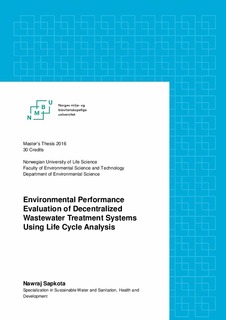| dc.description.abstract | Proper management of wastewater is a challenge for the cities in developing countries. The discharges of untreated wastewater into the urban rivers have huge impacts on public health as well as entire ecosystem of the earth. Therefore, treatment of wastewater is essential for the reduction of impacts on environment. Wastewater treatment plants remove the pollutant from the wastewater and thus reduce the pollutant load on the receiving water body. However the raw materials and energy required to build and operate the wastewater treatment systems also contribute to environmental burdens. Thereafter, the net environmental benefit of the wastewater treatment system can only be perceived by taking into account entire life cycle phases of the wastewater treatment system viz; construction, operation and demolition phases. In this study, Life Cycle Assessment (LCA) has been used as a tool for the sustainability assessment of small-scale decentralized wastewater treatment plants (WWTP) commonly used in developing countries. LCA is supportive to analyze the environmental burdens of WWTP that need to be a part of decision-making process towards sustainability. Life cycle assessment is known as cradle-to-grave analysis. LCA is a compilation and evaluation of the inputs, outputs and the potential environmental impact of a product system throughout its life cycle. The overall objective of the study is to analyze the environmental performance of the representative small-scale decentralized sanitation system.
In this study three-wastewater treatment scenario that consists of a combination of different small scale decentralized treatment methods are considered. The design capacities of the treatment modules used in the present study are 10 m3/day and 50 m3/day. The three Decentralized Wastewater Treatment (DEWATS) modules considered for the study are: 1) module 1 (DM1) consisting of Settler (S), Anaerobic Baffled Reactor (ABR), and Planted Gravel Filter (PGF), 2) module 2 (DM2) consisting of S, PGF and Collection Tank (CT) and 3) module 3 (DM3) consisting of S and PGF.
The Life Cycle Assessment was carried out as per ISO standards 14040-14044. In this study only the construction and operational phase was taken into account. The functional unit for this study is the treatment of wastewater generated by person equivalent over a period of 20 years.
In all modules, the greenhouse gas contribution (GWP) from the construction phase is 95% and 5% from operational stage. Acidification potential (AP) and Ozone layer depletion potential (ODP) are found to be 100% in construction periods. Among the treatment units, ABR has significant contribution to the eutrophication potential (EP). The other units like PGF, S and CT are responsible to the impact categories of AP, ODP and GWP. The study shows that configuration of the treatment units have an impact in the environmental performance. However, the more units the more environmental load is observed during the construction phase. On the other hand, increased in the units or treatment steps or modules increases the performance of system and hence decreases the environmental impacts of the whole system and vice versa. The production process of cement clinker, electricity, natural gas, brick, bituminous coal and transportation are responsible for the main impact during the construction phase. Based on the evaluation of three DEWATS modules, it cannot be said, which module is best, but the findings herein can support the decision-making process towards more sustainable DEWATS system. | nb_NO |
